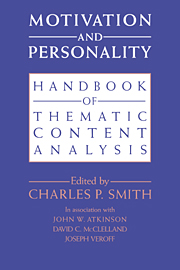Book contents
- Frontmatter
- Contents
- List of contributors
- Preface
- Acknowledgments
- 1 Introduction: inferences from verbal material
- PART I GENERAL ISSUES
- PART II CONTENT ANALYSIS SYSTEMS
- 9 The achievement motive
- 10 A scoring manual for the achievement motive
- 11 The motive to avoid success
- 12 A revised scoring manual for the motive to avoid success
- 13 The affiliation motive
- 14 A scoring manual for the affiliation motive
- 15 The intimacy motive
- 16 The intimacy motivation scoring system
- 17 Affiliative trust–mistrust
- 18 A scoring system for affiliative trust–mistrust
- 19 Power motivation
- 20 A scoring manual for the power motive
- 21 Power motivation revisited
- 22 A revised scoring system for the power motive
- 23 Personal causation and the origin concept
- 24 The origin scoring system
- 25 Explanatory style
- 26 The explanatory style scoring manual
- 27 Conceptual/integrative complexity
- 28 The conceptual/integrative complexity scoring manual
- 29 Uncertainty orientation
- 30 A manual for scoring need for uncertainty
- 31 Assessing adaptation to life changes in terms of psychological stances toward the environment
- 32 Scoring manual for psychological stances toward the environment
- 33 Self-definition and social definition: personal styles reflected in narrative style
- 34 Revised scoring manual for self-definition and social definition
- 35 Responsibility
- 36 Scoring system for responsibility
- PART III METHODOLOGY, SCORER TRAINING, DATA COLLECTION
- Appendix I Practice materials for learning the scoring systems
- Appendix II Pictures used to elicit thematic apperceptive stories
- Appendix III How to order additional practice materials
- References
- Name Index
- Subject Index
27 - Conceptual/integrative complexity
Published online by Cambridge University Press: 16 October 2009
- Frontmatter
- Contents
- List of contributors
- Preface
- Acknowledgments
- 1 Introduction: inferences from verbal material
- PART I GENERAL ISSUES
- PART II CONTENT ANALYSIS SYSTEMS
- 9 The achievement motive
- 10 A scoring manual for the achievement motive
- 11 The motive to avoid success
- 12 A revised scoring manual for the motive to avoid success
- 13 The affiliation motive
- 14 A scoring manual for the affiliation motive
- 15 The intimacy motive
- 16 The intimacy motivation scoring system
- 17 Affiliative trust–mistrust
- 18 A scoring system for affiliative trust–mistrust
- 19 Power motivation
- 20 A scoring manual for the power motive
- 21 Power motivation revisited
- 22 A revised scoring system for the power motive
- 23 Personal causation and the origin concept
- 24 The origin scoring system
- 25 Explanatory style
- 26 The explanatory style scoring manual
- 27 Conceptual/integrative complexity
- 28 The conceptual/integrative complexity scoring manual
- 29 Uncertainty orientation
- 30 A manual for scoring need for uncertainty
- 31 Assessing adaptation to life changes in terms of psychological stances toward the environment
- 32 Scoring manual for psychological stances toward the environment
- 33 Self-definition and social definition: personal styles reflected in narrative style
- 34 Revised scoring manual for self-definition and social definition
- 35 Responsibility
- 36 Scoring system for responsibility
- PART III METHODOLOGY, SCORER TRAINING, DATA COLLECTION
- Appendix I Practice materials for learning the scoring systems
- Appendix II Pictures used to elicit thematic apperceptive stories
- Appendix III How to order additional practice materials
- References
- Name Index
- Subject Index
Summary
THE DEVELOPMENT AND CURRENT STATE OF THE CONSTRUCT
Theoretical origins
The conceptual/integrative complexity construct is a descendant of Kelly's (1955) personal construct theory. Generally, it fits within the cognitive styles approach. Because the emphasis of the work is on the structure of thought rather than on its content, the closest relatives of integrative complexity are cognitive complexity (Bieri, 1971) and cognitive structure (Scott, Osgood, & Peterson, 1979). More remote kinship – the remoteness being empirically demonstrated by low correlations (Schroder, Driver, & Streufert, 1967; Suedfeld, Tomkins, & Tucker, 1969; Vannoy, 1965) – exists with contentladen cognitive traits such as authoritarianism (Adorno, Frenkel-Brunswik, Levinson, & Sanford, 1950), dogmatism (Rokeach, 1960), and field independence (Witkin, Dyk, Faterson, Goodenough, & Karp, 1962). The direct line of development proceeds through conceptual systems (Harvey, Hunt, & Schroder, 1961), conceptual complexity (Schroder et al., 1967), interactive complexity (Streufert & Streufert, 1978; Streufert & Swezey, 1987), to integrative complexity (Suedfeld & Tetlock, 1990) and meta-complexity (Streufert & Nogami, 1989).
Briefly, the successive versions of the theory focus on the complexity of information processing and decision making, complexity being defined and measured (usually on a 1–7 scale) in terms of degrees of differentiation and integration (cf. Streufert, 1970).
- Type
- Chapter
- Information
- Motivation and PersonalityHandbook of Thematic Content Analysis, pp. 393 - 400Publisher: Cambridge University PressPrint publication year: 1992
- 168
- Cited by



